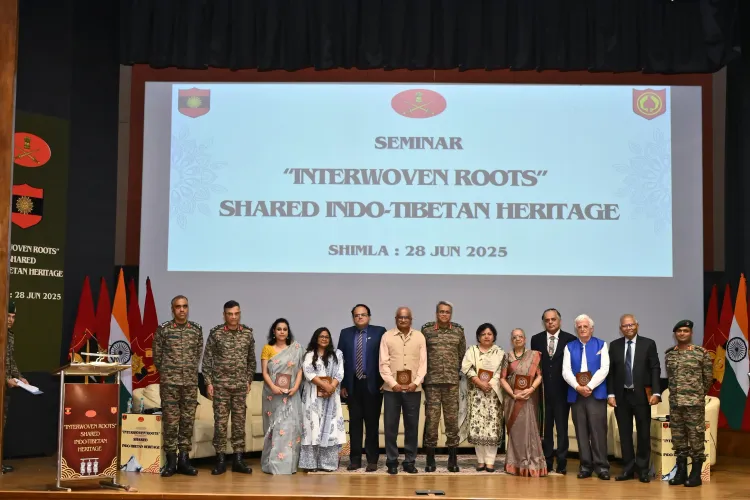How is the Indian Army Strengthening India-Tibet Relations?

Synopsis
Key Takeaways
- Importance of Cultural Understanding: Recognizing the historical and cultural ties between India and Tibet is crucial for national security.
- Holistic Border Security: Effective border management requires integrating cultural intelligence with military strategy.
- Engagement of Experts: Collaboration between scholars and military professionals enriches discussions on security challenges.
- Preserving Heritage: The Army emphasizes the need to safeguard cultural heritage as part of national integrity.
- Strategic Relevance: Understanding civilizational connections can inform contemporary defense policies.
Shimla, June 28 (NationPress) In a pivotal move aimed at strengthening national security through cultural insights, the Indian Army’s Central Command convened a seminar in the capital of Himachal Pradesh to delve into the profound civilisational connections between India and Tibet, evaluating their significance for modern border management and regional stability.
The seminar, titled “Interwoven Roots: Shared Indo-Tibetan Heritage”, was prompted by an increasing awareness among strategists that cultural depth and historical continuity are vital for national security, especially in the delicate Himalayan region.
India and Tibet share not only a border but also a rich, intricate relationship characterized by spiritual connections, cultural amalgamation, ancient trade routes, and mutual civilisational values.
The Indian Army's proactive role in both defense and development in these areas emphasizes a comprehensive approach to border security that integrates not just geography and military tactics but also cultural intelligence, community involvement, and historical appreciation.
The seminar brought together scholars, strategists, and senior military officials, serving as a forum to merge strategic analysis with cultural insights, empowering defense professionals to leverage historical perspectives in addressing emerging challenges in border regions.
The event commenced with a keynote address by Lt Gen Anindya Sengupta, General Officer Commanding-in-Chief of the Central Command, who highlighted the importance of cultural diplomacy in national strategy and reaffirmed the Army’s dedication to safeguarding India’s territorial and civilisational integrity.
The seminar comprised two thematic sessions, with the first focusing on Indo-Tibet connections and examining civilisational, spiritual, and economic relationships.
Tibetologist Claude Arpi discussed the historical and cultural ties between northern India and western Tibet, while Dr. Shashibala emphasized shared Buddhist traditions and sacred landscapes, and Dr. Aparna Negi reviewed traditional trade routes like Shipki La and their current relevance.
The second session tackled border management and strategic issues, moderated by Maj Gen G. Jaishankar, VSM (retd), and addressed topics such as China’s grey-zone tactics, India’s border doctrine, psychological and information warfare, and diplomatic coordination.
Participants included Lt Gen Raj Shukla (retd), Dr. Amrita Jash, Dr. Dattesh D Parulekar, Antara Ghosal Singh, and Amb Ashok K. Kantha.
Before the seminar, attendees visited forward areas from June 24-27, including Pooh, Shipki La, Nako, Sumdo, Giu, Tabo, and Kaza, which are situated near Tibet. These excursions provided an on-the-ground perspective of the socio-cultural landscape and strategic importance of the Indo-Tibetan frontier, reinforcing the seminar’s objective of connecting intellectual dialogues with tangible realities.
In his closing remarks, Lt Gen D.G. Misra, GOC of the Uttar Bharat Area, underscored the need for integrating cultural continuity with strategic foresight to protect India's border regions.
He praised the speakers for their academic contributions and reiterated the Army’s commitment to fostering platforms that encourage civil-military-academic collaboration.
This seminar is part of a larger initiative by the Indian Army to weave together regional awareness, cultural heritage, and academic insight into the broader narrative of national security, ensuring India's borders are defended not only through force but also through understanding.








